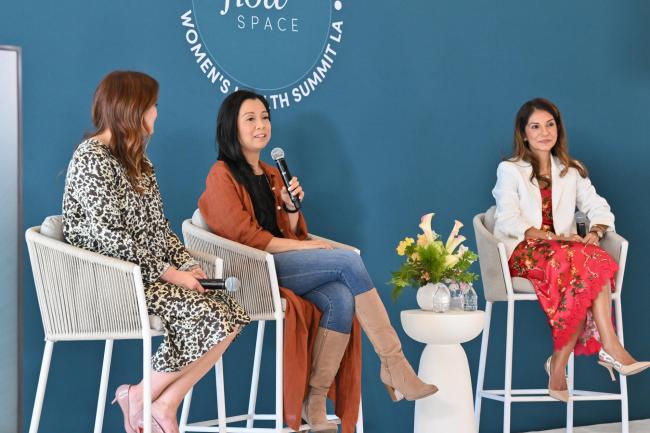Hormone therapy has long been one of the most misunderstood topics in women’s health. But according to experts at the Flow Space Women’s Health Summit, the right timing can make all the difference—not only in easing menopause symptoms, but in supporting long-term health and longevity.
Moderated by Flow Space editor-in-chief Galina Espinoza, the panel featured Dr. Jila Senemar, a board-certified OB-GYN and founder of Jila MD, and Dr. Jaclyn Tolentino, a functional and integrative medicine physician and breast cancer survivor. Together, they broke down the latest science on when to start hormone therapy and why getting that window right could add healthy years to your life.
The Window of Opportunity
Senemar began by demystifying the transition from perimenopause to menopause. “When you’re in your late 30s or early 40s, this shift can start to happen, and it can last between five to 10 years,” she said. “Your ovaries are still working—they’re just not as regulated as they used to be.”
And while, “menopause itself is really one day in your life,” she explained—it’s the years around that day that matter most.
Tolentino emphasized what researchers now call the “window of opportunity” for starting hormone therapy: the first ten years after menopause. “The earlier you start hormone therapy in that window, the more likely you are to see benefits—not just for your symptoms, but for your brain, bones, heart and metabolic health,” she said.
That’s because estrogen is a multi-system protector. When levels drop, women face increased risks for heart disease, osteoporosis and cognitive decline. Replacing those hormones sooner, rather than later, can help preserve long-term health.
Why Waiting Too Long Can Cost You
For two decades, the Women’s Health Initiative (WHI) study discouraged many from pursuing hormone therapy—leaving an entire generation to suffer in silence. “We’re now realizing that hormones do not cause breast cancer,” said Tolentino. “The narrative for the last 20 years has been the opposite, and so many more women are now coming forward and advocating, saying, ‘There is an issue with the data.’”
Senemar added that waiting until symptoms are extreme or years after menopause may reduce the potential benefits. “You don’t need to be in menopause in order to start,” she said. “If you’re 46 and having symptoms—and your diet and exercise are on point—but you still don’t feel well, now we can experiment with some hormones and see how to get you feeling better.”
That timing isn’t just about comfort—it’s about prevention. “The first 10 years after menopause are when you’ll benefit most from hormone therapy,” Senemar noted. “But that doesn’t mean if you’re 61, you can’t have the conversation.”
Hormone Therapy as Part of a Bigger Picture
While both experts championed early intervention, they also stressed that hormone therapy works best alongside foundational health habits. “Hormone therapy isn’t a magic bullet,” said Senemar. “It takes everything—sleep, stress management, nutrition, movement. The foundation has to be set before you can add hormones.”
Tolentino agreed, noting that functional medicine’s role is to treat the whole woman, not just her lab results. “The problem is that people see a doctor who might just be looking at one piece—the headaches, the weight gain—but not taking a step back to recognize that, holistically, this person might be in perimenopause.”
A New Era for Menopause Care
Both experts agreed that the stigma around hormone therapy is finally fading as more women speak up. “Menopause equates aging, and who wants to be that?” said Senemar. “For so long, it was all about reproduction. These are narratives that need to be shifted—and that’s what we’re here for.”
The takeaway was clear: Knowledge is power, and the best time to act is sooner than most women think. “We are not a quiet generation,” Senemar said. “We’re talking about it more, and the taboo has shifted.”
For women in their 40s and 50s, that shift could be life-changing—literally.


